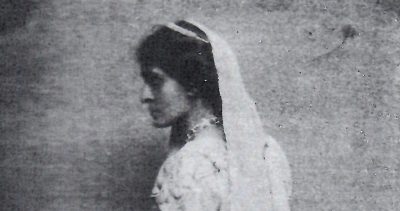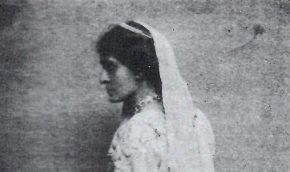First woman to study law at Oxford University, first female advocate in India and first woman to practice law in India and Britain.
Women in Law
- Introduction
- Timeline
- Joyce Bamford-Addo
- Marion Billson
- Jill Black
- Elizabeth Butler-Sloss
- Sue Carr
- Eugenia Charles
- Lynda Clark
- Freda Corbet
- Coomee Rustom Dantra
- Leeona Dorrian
- Heather Hallett
- Frene Ginwala
- Rosalyn Higgins
- Daw Phar Hmee
- Lim Beng Hong
- Dorothy Knight Dix
- Sara Lawson
- Elizabeth Lane
- Theodora Llewelyn Davies
- Gladys Ramsarran
- Lucy See
- Evelyn Sharp
- Victoria Sharp
- Ingrid Simler
- Teo Soon Kim
- Ivy Williams
- The Significance of the Sex Disqualification (Removal) Act 1919
- Podcasts
Home › Women in Law › Pioneering Women in Law › Cornelia Sorabji
Cornelia Sorabji
1866-1954
Cornelia Sorabji was the first woman to study law at Oxford University, after travelling to Britain from Puna (Poona) in India in 1889. The daughter of parents who were Christian converts and who valued women’s education, she was welcomed and supported by prominent men and women in Britain (including Benjamin Jowett and Frederick Pollock at Oxford), who believed that educated Indian women would help to ‘civilise’ India.
Sorabji became the first woman to pass the BCL examinations at Oxford in 1892, although she did not receive her degree until the University granted degrees to women after World War I.


Cornelia Sorabji
In 1893, she returned to India, where she was initially permitted to plead in some local courts.
Thus, in 1896, she became the first woman in the British Empire to plead before a British judge
when she successfully defended an accused charged with murder, an accomplishment recorded in both the British and overseas press. However, her subsequent application for permission to plead in the Allahabad High Court was refused because she was a woman, as was her later application for admission as a vakil (pleader).
In 1901, Sorabji travelled back to Britain to lobby for a unique appointment as ‘Lady Assistant to the Court of Wards,’ a position within the British administration in northern India. In 1904, she obtained this appointment for Bengal, Bihar and Orissa, and Asam, where she provided legal assistance to the Purdahnashin (women precluded from consulting male lawyers) in relation to their estates. Thus, she created a ‘niche’ legal practise without challenging male exclusivity in the legal professions; indeed, she criticised Bertha Cave’s ‘direct’ challenge, by contrast with her own (more successful) approach. Sorabji’s work required expertise in Muslim and Hindu property law as well as excellent negotiation skills to ensure protection for her Purdahnashin clients, and her annual reports detailed her challenges and accomplishments. For example, her 1916 report confirmed her provision of legal assistance to 110 estates, representing 176 women, 139 boys and 95 girls, and that she had travelled more than 20,000 miles by rail, road and water. Sorabji retired from this position in 1922; there was no subsequent appointment.
After the enactment of the Sex Disqualification (Removal) Act, 1919, Sorabji had been admitted as a vakil in India. Moreover, at the age of fifty-five, having completed a pupillage at Lincoln’s Inn, she was called to the Bar in Britain in 1923, the second Indian woman after Mithan Tata Lam (who had been admitted just a few months before Sorabji). After the enactment of the Legal Practitioners (Women) Act, 1923 in India, Sorabji practised at the bar in Kolkata (Calcutta) and continued to advise and represent the Purdahnashin and other clients. However, there were ongoing challenges: she was initially excluded from using the Bar Library, she had difficulty obtaining briefs (especially paid briefs), and some legal colleagues alienated potential clients, claiming ‘no woman can know the law.’ Although Sorabji was quite isolated as a woman barrister in India in the 1920s, she persevered and enjoyed some success in her work, particularly for the Purdahnashin.
Sorabji also published nine books, including two about the Purdahnashin: Love and Life behind the Purdah (1901) and The Purdahnashin (1917). In the 1930s, she published two autobiographical books: India Calling (1934) and India Recalled (1936). In addition, she regularly published articles and comments about India in British journals; and, as a fervent supporter of the British Raj in the 1930s and 40s, she published critical comments about Gandhi’s nationalist movement. She also travelled to Canada and the United States to critique Gandhi, and published her views in The Atlantic in 1931. In the late 1930s, Sorabji moved permanently to Britain, and lived through the bombing in London during World War II. She died in London in 1954, a few months before her eighty-eighth birthday.
Although one obituary suggested that Sorabji had:
no peer among the women of India
her story apparently disappeared for decades. As Vera Brittain explained, Sorabji had chosen:
the wrong direction at an important moment in [Indian] history, and [had thus been] repudiated by the currents of her time … which tends to withhold from her the status that is her due.
Significantly, after Sorabji’s death, Helena Normanton credited Sorabji’s support for the success of a motion in support of women lawyers at a Lincoln’s Inn debate in April 1919: with ‘a speech so eloquent, … the victory that night [and then the 1919 statute were] due to her career and her advocacy.’
Professor Emerita Mary Jane Mossman
Osgoode Law School
References
Mary Jane Mossman, The First Women Lawyers: A Comparative Study of Gender, Law and the Legal Professions (Oxford: Hart Publishing, 2006)
Suparna Gooptu, Cornelia Sorabji, India’s First Woman Lawyer: A Biography (New Delhi: Oxford university Press, 2006)
Richard Sorabji, Opening Doors: The Untold Story of Cornelia Sorabji: Reformer, Lawyer and Champion of Women’s Rights in India (Great Britain: JB Tauris & Co, 2010; and New Delhi: Penguin, 2010)
Antoinette Burton, ‘The Purdahnashin in Her Setting: Colonial Modernity and the Zenana in Cornelia Sorabji’s Memoirs’ (2000) 65 Feminist Review 145